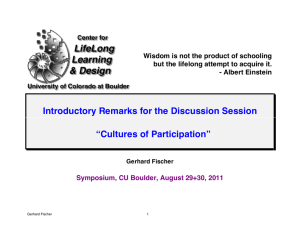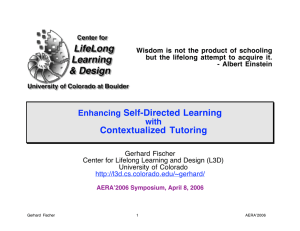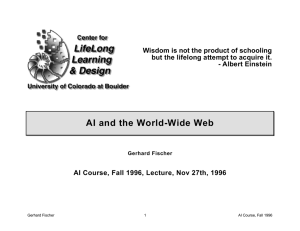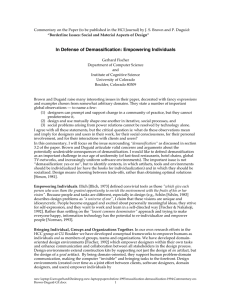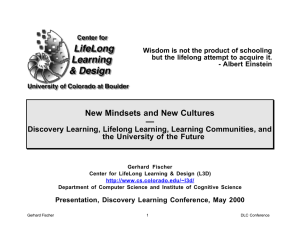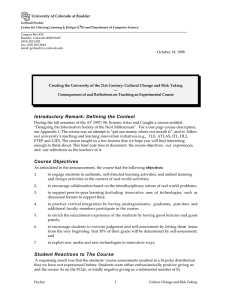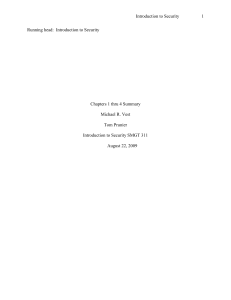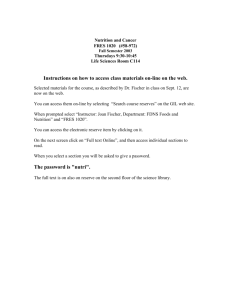Cultures of Participation, Long Tail Learning, and Energy Sustainability
advertisement
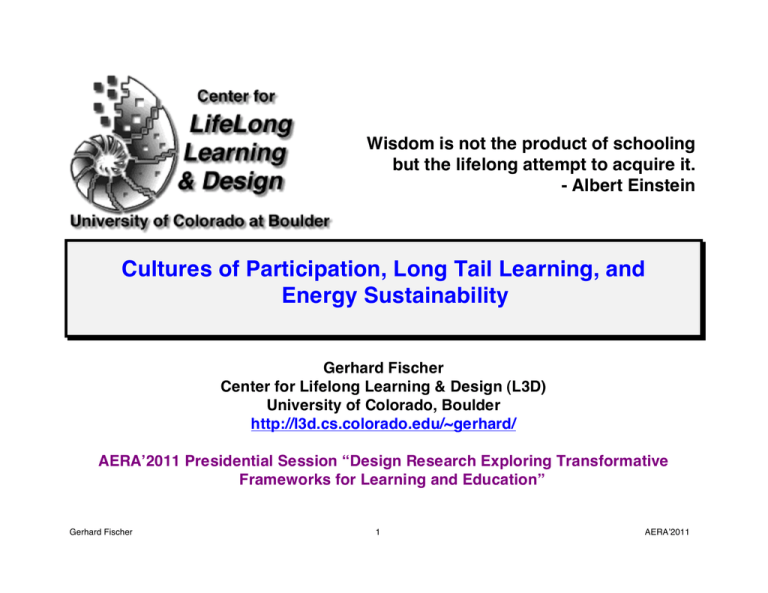
Wisdom is not the product of schooling but the lifelong attempt to acquire it. - Albert Einstein Cultures of Participation, Long Tail Learning, and Energy Sustainability Gerhard Fischer Center for Lifelong Learning & Design (L3D) University of Colorado, Boulder http://l3d.cs.colorado.edu/~gerhard/ AERA’2011 Presidential Session “Design Research Exploring Transformative Frameworks for Learning and Education” Gerhard Fischer 1 AERA’2011 Transformational Frameworks for Learning and Education Existing Framework Complementing New Framework school learning lifelong learning consumers active contributors (cultures of participation) teacher driven (curriculum) learner-driven (idiosyncratic interests: long tail) learning when the answer is known learning when no one knows the answer (education research for the public good: energy sustainability) Gerhard Fischer 2 AERA’2011 Fundamental (?) Transformations — many new approaches are too timid and not thinking radically enough by accepting too many established approaches — e.g.: a theory of human learning based solely on school learning is too limited by seeing “schools” as a “God-given” or “natural” entity rather than a social construct by not embracing new learning opportunities — e.g.: exploiting the unique opportunities of social production in which all learners can act as active contributors in personally meaningful problems Gerhard Fischer 3 AERA’2011 Cultures of Participation consumer cultures focus: produce finished goods to be consumed passively ⇓ cultures of participation focus: provide all people are with the means to participate actively in personally meaningful problems Gerhard Fischer 4 AERA’2011 Examples of Environments Created by Cultures of Participation Site Objectives and Unique Aspects Wikipedia web-based collaborative multilingual encyclopedia; authority is distributed (http://www.wikipedia.org/) iTunes U courses by faculty members from “certified institutions”; control via input filters (http://www.apple.com/education/itunes-u/) Scratch creating, remixing, and sharing programs to build creative communities in education (http://scratch.mit.edu) Instructables user-created and shared do-it-yourself projects involving others users as raters and critics (http://www.instructables.com/) PatientsLikeMe real-world experiences enabling patients suffering from diseases to connect (http://www.patientslikeme.com/) Stepgreen Gerhard Fischer library of energy saving actions, tips, and recommendations by citizen contributors (http://www.stepgreen.org/) 5 AERA’2011 The Envisionment and Discovery Collaboratory Gerhard Fischer 6 AERA’2011 The Long Tail Framework theory of the Long Tail (originated in the business world): our culture and economy is increasingly shifting away from a focus on a relatively small number of “hits” (mainstream products and markets) at the head of the demand curve and toward a huge number of “niches” in the tail examples from the business world: our objective: understanding, fostering, and supporting interest-driven and passion-based learning Gerhard Fischer 7 AERA’2011 The Long Tail Framework in Learning and Education learn about exotic but personally important topics outside the mainstream education curriculum communicate with people who share similar niche interests anywhere in the world contribute your own knowledge to evolve and enrich living, open information spaces Gerhard Fischer 8 AERA’2011 Basic Beliefs the participatory Internet (“Web 2.0”) supports the design requirements for a Long Tail inspired view of learning and education most people are interested / feel passionate about something (which maybe be very idiosyncratic, locally sparse, but world-wide there maybe still some niche communities) examples: - astronomy, casino games, Viking Ships. Model trains, wines, jewelry, carpets - urban planning, 3D models, open source, energy sustainability people are getting engaged in thousands of cultural tribes of interest, connected less by geographic proximity than by shared interest Gerhard Fischer 9 AERA’2011 A Reinterpretation of the Long Tail for Learning and Education Web-Based Businesses Learning and Education requirement unlimited shelf-space unlimited knowledge content of the head megahits core curriculum content of the tail niche markets unique topics, niche communities major limitation many interesting books, without support for movies, songs will not the long tail enter the marketplace many interesting topics and ideas will not be taught in formal learning environments coping with infinite choice recommendation systems user and task models for personalized learning paths structures and interdependencies individual objects are mostly independent prerequisite structures may exist Gerhard Fischer 10 AERA’2011 Energy Sustainability Education Research for the Public Good energy sustainability is one of the most fundamental problems facing our societies new technologies are necessary, but not sufficient required: change in human understanding and human behavior (at the individual and collective level) Gerhard Fischer 11 AERA’2011 Understanding and Behavior towards (Electrical) Energy “I use energy (at home, at work) but it’s invisible. I don’t consume it directly but only via things I want like light, heat and refrigeration.” “The amount of energy I use is registered on a meter that’s out of sight, unintelligible, and read by someone else.” “At work, I get no feedback at all — which does not worry me because I do not pay the bill anyway.” “Even when I understand the information, I rarely act.” Gerhard Fischer 12 AERA’2011 Learning and Understanding with New Designs Personally Example: a power cord which indicates by its color the power consumption Gerhard Fischer Globally Example: annual carbon emissions by region 13 AERA’2011 The Core Objective of my Professional Life to create socio-technical environments (a design activity) in which people of all ages (lifelong learning) want to learn rather than have to learn Gerhard Fischer 14 AERA’2011
